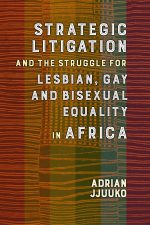-
Lenin150 (Samizdat): 2nd expanded edition
For all the official historiographic efforts at forging a mythologised image of Vladimir Ilyich Ulyanov as the austere, no-nonsense, professional revolutionary, the really existing flesh and blood Lenin understood and appreciated that the most materialist action an individual must carry out without fault to metabolise the struggle for communism is to breathe. Not just biologically respire but consciously breathe. Breathe for oneself and breathe for and with others. If it is indeed our desire to breathe new life into the long choking red star, a new oxygenic Communist politics of walking and breathing is what we must aspire to, inspire, respire and encourage.
See the Description below for further details.
-
Struggling to be seen: The travails of Palestinian cinema
The book explores the challenges Palestinian filmmakers confront to develop a cinema that gives expression to the national narrative. It is based on collaborative research involving Film Lab Palestine, Sheffield Palestine Cultural Exchange and Sheffield Hallam University. We explore the political, economic and cultural contexts that impact on Palestinian film production and some of the barriers encountered in profiling and screening Palestinian films, to shed light on the complex terrain that is traversed to sustain and develop a film industry and film culture in historic Palestine and beyond.
Table of contents
Image credits
Introduction
The struggle to develop a national cinema
The experience of Filmlab Palestine
Visualising the Palestinian past
Roadblocks, borders and hostile environments
The screening and reception of Palestinian films
The Palestinian short film
Conclusion
Filmography
Appendix 1: Cinema of the Palestinian Revolution
Appendix 2: 70 Years of Nakba: Audience response
Appendix 3: Love and Desire in Palestine: Audience response
Appendix 4: Selection of leaflets from film screenings
About the authorsPraise for Struggling to be seen
To so nimbly and elegantly traverse Palestinian time and space is itself a defiance of the occupation’s brutally enforced barriers. The authors’ unstintingly political examination of Palestinian cinema has much to offer both those in the know and readers new to this extraordinary body of work. — Kay Dickinson, Professor, Film Studies, Concordia University
Working extensively through primary sources, conducting research and interviews across generations of Palestinian filmmakers, the authors offer the reader an ambitious and wide-ranging essay which charts the development of a national Palestinian cinema, from an historical and critical perspective. By exploring the constellation of political, social and aesthetic concerns that shape this cinema, this authors challenge us to rethink the stakes behind the contemporary development of a Palestinian cinema industry, its audience reception, in historic Palestine and beyond.— Samia Labidi, cultural programmer & artistic curator
Illuminating and compelling, Struggling to be Seen lays bare the historical, enduring but also emerging (colonial and neocolonial) obstacles to the development of a film industry and film culture within the West Bank and Gaza. Though familiarly sobering (in its re-confirmation of the scale of injustice facing Palestinians), the book provides up-to-the-moment and an interdisciplinary account that provides rich, fresh terrain that reveals new and exciting progressions within Palestinian film culture. —Michele Aaron, Reader in Film and Television, University of Warwick, author of Death and the Moving Image: Ideology, Iconography and I (Edinburgh Univer- sity Press, 2014) Director, Screening Rights Film Festival.
Struggling to be Seen is a must read for those who are interested in under- standing the multilayered challenges that face Palestinian cinematography from its production phase to its screening phase. The book is a short read which takes the readers through the different stages which shaped the Palestinian film making enterprise. Struggling to be Seen shows the restrictions that Palestinian filmmakers face from the initial stages to funding and screening. The authors tell a story of a people whose sense of self-reflection is suppressed by the Israeli oppressive machine which con- stantly works at erasing the Palestinian peoplehood, detaching it from its past.— Nahed Habiballah, Assistant Professor and member of the Board of Directors of Policy and Conflict Resolution Studies Center, Arab American University, Ramallah, Palestine
-
I am a man of peace: Writings inspired by the Maynooth University Ken Saro-Wiwa Collection
This book marks the 25th anniversary of the execution of Nigerian activist and written Ken Saro-Wiwa. The 21 essays, by international contributors, and 42 poems by new and established poets, are inspired by his ideals and activism.
The volume includes contributions by people intimately connected with Saro-Wiwa. His brother Dr Owens Wiwa recounts how his older brother awakened and nurtured his awareness of the tremendous damage Royal Dutch Shell was doing to their homeland, in collaboration with the then Nigerian military government. His firsthand account of the brutality of the military government and its impact; his unsuccessful efforts to save the life of his brother; his time in hiding and subsequent escape, with his family, from Nigeria and his efforts to retrieve the remains of his brother for burial, makes for very moving reading. Likewise, Noo Saro-Wiwa shares her story of growing up in England with strong links to family in Nigeria, and the trauma of hearing of her father’s execution while at University.
Maynooth University, where the editor works as Deputy Librarian, holds the death row correspondence from Ken Saro-Wiwa to Sister Majella McCarron. McCarron provides two personal essays. One, a reflection on the events that shaped her work with Saro-Wiwa in Nigeria and her subsequent efforts to save the lives of the Ogoni 9: the second essay explores her experience as a table observer of the Shell to Sea campaign, which strove to have gas, discovered off the west coast of Ireland, refined at sea rather than inland.
The damage that Shell has caused in Ogoni and the issue of redress are topics addressed in essays by experts including Mark Dummett, of Amnesty International, who investigated how Shell and other oil companies have caused or contributed to human rights abuses through their operations in the Niger Delta. Daniel Leader, a barrister and partner at Leigh Day’s international law department, the firm who have led a number of ground breaking human rights cases, including a series of cases against Shell on behalf of Nigerian communities, explores the issue of legal redress. Architect, environmental activist, author and poet Nnimmo Bassesy’s wide ranging essay presents Saro-Wiwa as activist and writer and creator of the Ogoni Bill of Rights, against the backdrop of the UNEP report of the Environmental Assessment of Ogoniland, which recorded that drinking water in Ogoni had benzene, a carcinogen, at over 900 times the level permitted
I welcome the publication of this volume which highlights the work of Trócaire and other people and organisations
to fight for a more just world. Trócaire campaigned strongly for the release of the Ogoni 9 and continues to campaign for justice in the face of state and corporate violations of human rights. The writings of Ken Saro-Wiwa and those inspired by his work keep the flame of justice lit.Dr Caoimhe De Barra, Chief Executive Officer, Trócaire.
The publication of I am a Man of Peace: Writings Inspired by the Maynooth University Ken Saro-Wiwa Collection highlights the shift towards peaceful protests as a means to a more sustainable end. It is a justification that one’s dreams for the greater good can still be attained without bloodshed. Ken preached, lived, and practiced peace in his search for justice even in the face of stiff opposition. Years after his death, Ken’s ideologies and philosophies have proved relevant today.
Dr Owens Wiwa, Executive Vice-President, Clinton Health Access Initiative (CHAI).
Sister Majella McCarron’s choice of Maynooth University for this unique donation was particularly appropriate, given the University’s long involvement with issues of inclusion and justice in Ireland and abroad. This deep-rooted commitment is today articulated in our University Strategic Plan, where a strategic goal is ‘to build on our achievements to date and become a model University for equality, diversity, inclusion and inter-culturalism, where social justice, addressing inequality and empowering people are central to our mission.’ This book makes a significant contribution to that goal.
Dr. Gemma Irvine, Vice-President of Equality & Diversity, Maynooth University.
Writing can urge us to pause, to think, and to discover what we really want to say. Sharing that writing calls for courage and support. In this publication, as Jessica Traynor suggests, we see the evidence of a new generation of Irish and new Irish citizens engaging with complex issues through poetry. Reading their poems, we may begin to understand more about each other and ourselves. By bringing together these Irish and new Irish voices the book contributes to building a shared discourse which is essential for trust, community and hope.
Dr Alison Farrell, Founder of the Summer Writing Institute For Teachers (SWIFT) and Co-founder Irish Network for the Enhancement of Writing (INEW)
-
Fanon and the rationality of revolt
We inhabit extraordinary times: times in which we are acutely aware of the intensity of what revolutionary thinker Frantz Fanon called “the glare of history’s floodlights.” The velocity and scale at which the revolt against police murder that began in Minnesota after the death of George Floyd on May 25th and moved throughout the US, and then other parts of the world, was astonishing. It was impossible to predict, but then, in retrospect, it is George Floyd’s death becomes a nodal point: calling for action as well as rethinking and self-clarification. Thinking about this moment with the world revolutionary Frantz Fanon, we need to be aware of continuities and discontinuities — or, as he puts it, opacities — between the ages, his and ours. Fanon is always speaking to us, but often in ways we cannot hear. We have to work to listen to him and to understand the new contexts and meanings in relative opacity. It is this constant dialogue that helps illuminate the present and enable ongoing fidelity to Fanon’s call in the conclusion of The Wretched of the Earth the necessity to work out new concepts to confront one of Fanon’s greatest concerns, the betrayal of the revolutionary movement. In this pamphlet we consider how Fanon’s idea of liberation is connected with “the rationality of revolt.” The practice of engaging Fanon not only with revolt but with the reason or rationality of revolt connects with Fanon’s idea of how this liberated humanity is a product of a new consciousness of collectivity open to rethink everything.
-
in, against, beyond, corona
The corona crisis reveals what is wrong and toxic — in ourselves, in relation with others, and in relation with the rest of non-human nature. But we can also look for what is good and life-affirming. The authors argue that the future must be founded on ‘kindness, social solidarity and an appropriate scale of time’, a future that cherishes life and the connections that transcend borders. This pamphlet is a vital contribution to much needed reflections and discussion.
This is a fabulous book. Usually a blurb or endorsement like this is supposed to enhance the book, but in this case the flow is in the other direction. For me it is a huge honour to be associated with it. Like many others, I have been trying for months to get my head around what is happening, trying to formulate my ideas, and then here it is, in these pages, so clear, so understanding, so challenging. How we now go on to shape the interconnectedness between people and between people and other forms of life will determine the future of humanity. The best, most sensitive, most realistic, strongest thing that I’ve read on the Corona Crisis. — John Holloway, Professor, Institute for Humanities and Social Sciences, Autonomous University of Puebla, Mexico, and author of In, Against, and Beyond Capitalism:
The San Francisco LecturesThis pamphlet, part of Daraja Press’s Thinking Freedom Series, is written by Mark Butler with his colleagues at the Church Land Programme, a small independent non-profit organisation based in KwaZulu-Natal province, South Africa, that seek to distill learnings that emerge from the work of militants on the ground.
-
Finding a Voice: Asian Women in Britain (New and Expanded Edition)
First published in 1978, and winning the Martin Luther King Memorial Prize for that year, Finding a Voice established a new discourse on South Asian women’s lives and struggles in Britain. Through discussions, interviews and intimate one-to-one conversations with South Asian women, in Urdu, Hindi, Bengali and English, it explored family relationships, the violence of immigration policies, deeply colonial mental health services, militancy at work and also friendship and love. The seventies was a time of some iconic anti-racist and working-class struggles. They are presented here from the point of view of the women who participated in and led them.
This new edition includes a preface by Meena Kandasamy, some historic photographs, and a remarkable new chapter titled ‘In conversation with Finding a Voice: 40 years on’ in which younger South Asian women write about their own lives and struggles weaving them around those portrayed in the book.
An amazing review of the book can be read here: https://librofulltime.wordpress.com/2023/03/03/book-review-amrit-wilson-finding-a-voice-asian-women-in-britain/
Here is an extract:
This book is a call to collective action and sisterhood, a memorial and an instruction to keep going. In her Reflections, Wilson points out White feminists need to let Asian women work on their own problems while standing in support, not intrude and try to sort their issues out for them, and the valuable material she gathers in this book is indeed because she was part of the communities she was studying, speaking to the women in their kitchens in their own languages. I was so pleased to be able to revisit this wonderful work. – Lix Dexter @LyzzyBee_Libro
A great interview with Amrit Wilson in Montreal Serai (October 4, 2020).
‘This book is a wonderful, important and necessary reminder of all the black feminist work behind us and all that is left to do.’ —Sara Ahmed, feminist writer and independent scholar, and author of Living a Feminist Life
‘Finding a Voice acquires a new significance in this neoliberal era…an indispensable archive as well as a narrative of a past that is not past but reactivated and recast…’ —Kumkum Sangari, William F.Vilas Research Professor of English and the Humanities, University of Wisconsin-Milwaukee
‘A ground-breaking book, as relevant today as it was in the seventies – and evidence, if ever such were needed, that the struggles of Asian, African and Caribbean women remain inextricably linked.’ —Stella Dadzie, founder member of OWAAD and author of Heart of the Race
‘Finding a Voice… was affirmation that our lives mattered, that our experiences with all their cultural complexities, mattered.’ —Meera Syal, British comedian, writer, playwright, singer, journalist, producer and actress.
‘This new edition comes at a time…when we are experiencing the growth of the surveillance state and when our narratives are being co-opted and used against us. Finding a Voiceis not only welcome, it is necessary.’ — Marai Larasi, Director, Imkaan; Co-Chair of UK’s End Violence Against Women Coalition.
Amrit Wilson is a writer and activist on issues of race and gender in Britain and South Asian politics. She is a founder member of South Asia Solidarity Group and the Freedom Without Fear Platform, and board member of Imkaan, a Black, South Asian and minority ethnic women’s organisation dedicated to combating violence against women in Britain. She was a founder member of Awaz and an active member of OWAAD. She is author, amongst other books, of Dreams Questions Struggles—South Asian women in Britain (Pluto Press 2006) and The Challenge Road: Women and the Eritrean revolution (Africa World Press 1991). The first edition of Finding a Voice: Asian Women in Britain won the the Martin Luther King Jr award.
It is the impact of oppression, racism and class which unifies South Asian women and the book comes at a time where we see the continued rise of the far right, misogyny, issues of class and the gig economy here and across the globe being played out in the media and perpetuated by male leaders going unchallenged by the state.
These new voices confirm how groundbreaking the book has been as a reference point for south Asian women now through listening to the voices of women from four decades ago, honouring their contribution and speaking in solidarity with them. As Wilson says in her introduction, it “reclaims our collective past as an act of resistance.”
An excellent read.
‘Reclaiming our collective past’: Amrit Wilson reflects on 40 years of anti-racist feminist work
By Sophia Siddiqui ARCHIVESPOLITICS 30th October 2018
http://gal-dem.com/collective-past-amrit-wilson-reflects-anti-racist-feminist-work/?fbclid=IwAR2qF13MA82F-9hztnRg4hN8ry5EEiZ2rYUtzX4OPuG7CELOzffhCTBjm4o -
October 1917 Revolution: A century later
Great revolutions make history. Conservative resistance and counter-revolutions only delay their progress. The French revolution invented modern politics and democracy, the Russian revolution paved the way for the socialist transition, while the Chinese revolution connected the emancipation of those peoples oppressed by imperialism with the path to socialism. These revolutions are great precisely because they are bearers of undertakings that are far ahead of the immediate demands of their time. beacons that illuminate the still unfinished struggles of the peoples for the realization of these goals. It is impossible to understand the contemporary world by ignoring these great revolutions. To commemorate these revolutions, says Samir Amin, one needs both to assess their ambitions (the utopia of today will be the reality of tomorrow), and to understand the reasons for their temporary setbacks. Conservative and reactionary minds refuse to do so—they wish us to believe that great revolutions have been nothing more than unfortunate accidents, that the peoples who have made them were carried away by their deceitful enthusiasm, diversions from the normal current of history. This collection of essays helps to situate the lessons of the October 1917 Russian Revolution from a perspective of 100 years.
Egyptian economist and intellectual, Samir Amin (1931-2018), was one of the world’s greatest radical thinkers —a creative Marxist’. He was the director of Third World Forum (Forum du tiers monde), Dakar and President of the World Forum for Alternatives. He published numerous books and papers, including The Law of Value and Historical Materialism, Eurocentrism – Modernity, Religion and Democracy: A Critique of Eurocentrism and Culturalism, Ending the Crisis of Capitalism or Ending Capitalism?‘, Global History – a View from the South and Russia and the Long Transition from Capitalism to Socialism
-
Poems for the Penniless
These poems by Issa Shivji, lawyer, activist and Tanzanian public intellectual, were written at different times in different circumstances. They give vent to personal anguish and political anger. Mostly originally written in Kiswahili, here accompanied by English translations, and they are intensely personal and political.
Poems are clustered under several headings to provide a context. The first combines personal agony at the loss of comrades and friends with poems about love and affection for living ones. The second is about robberies of freedom, resources, and dignity and the loss of justice under neoliberalism. The third section, entitled Hopes and Fears, comprises short poems tweeted over the last five years expressing despair, fear and hope in the human capacity for freedom.
The last section are poems, concerned with Shivji’s period in South Africa in 2018, reflect on the emergence of neo-apartheid with its wanton and shameless exploitation of the majority.
Wonderfully translated by Ida Hadjivayanis.
-
Claim No Easy Victories: The Legacy of Amilcar Cabral
USD $ 35.00This collection of essays explores the multifaceted nature of the Amílcar Cabral’s legacy with the specific goal of understanding his relevance to contemporary politics. Ranging from his philosophical arguments about culture and colonialism to more concrete historical explorations of his impact on African American movements in the United States, the book is an accessible and valuable introduction to Cabral’s thought. … As a collection it is a timely one and will be valuable for anyone seeking to be introduced or reacquainted with debates about revolution, colonialism and culture, nationalism, and pan-Africanism. Claudia Gastrow in Feminist Africa
2013 marked the 40th anniversary of the assassination of Amilcar Cabral, a revolutionary, poet, liberation philosopher, and leader of the independence movement of Guinea Bissau and Cap Verde. Cabral’s influence stretched well beyond the shores of West Africa. He had a profound influence on the pan-Africanist movement and the black liberation movement in the US. In this unique collection of essays, contemporary thinkers from across Africa and internationally commemorate the anniversary of Cabral’s assassination. They reflect on the legacy of this extraordinary individual and his relevance to contemporary struggles for self-determination and emancipation. The book serves both as an introduction, or reintroduction, to one whom global capitalism would rather see forgotten. Understanding Cabral sheds light on the necessity of grounding radical change in the creation of theory based on the actual conditions within which a movement is attempting to develop. Cabral’s theoretical ideas and revolutionary practice of building popular movements for liberation are assessed by each of the authors as critically relevant today. His well-known phrase “Claim no easy victories” resonates today no less than it did during his lifetime. The volume comprises sections on Cabral’s legacy; reflections on the relevance of his ideas; Cabral and the emancipation of women; Cabral and the pan-Africanists; culture and education; and Cabral’s contribution to African American struggles. A selected bibliography provides an overview of Cabral’s writings and of writings about Cabral.
-
Silence Would Be Treason: Last writings of Ken Saro-Wiwa (Expanded 2nd Edition)
Edited by Íde Corley, Helen Fallon, Laurence Cox
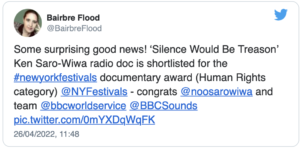
Recent tweet about good news of the radio documentary on Silence Would Be Treason being shortlisted for the #newyorkfestivals documentary award (Human Rights category). Congrats to @noosarowiwa et al. These letters and poems are invaluable fragments of a living conversation that portrays the indomitable power in humans to stay alive in the face of certain death – to stay alive even in death.
Reading through the treasure trove of the letters and poems compiled here as The Last Writings of Ken Saro-Wiwa evokes intense memories of his resolute struggles against an oil behemoth and a deaf autocratic government. His crusade frames one of the most tumultuous periods of Nigeria’s history; his tragic story evokes anger and demands action to resolve the crises that first led the Ogoni people to demand that Shell clean up Ogoni lands or clear out of the territory.
I
-
Wreaths for a Wayfarer: An Anthology in Honour of Pius Adesanmi
Pius Adesanmi died in the doomed Ethiopian Airline flight 302 on March 10, 2019. Wreaths for a Wayfarer: An Anthology in Honour of Pius Adesanmi is an assemblage of 267 original poems written by 127 established and emerging African writers. While some of the poets celebrate Adesanmi, others reflect philosophically on existence, mortality, immortality and/or offer hope for the living. In this memorably textured collection, the poets – some who knew, and some who did not know Adesanmi – exorcise the pains of loss through provocative poems that pour out their beating hearts with passion.
Chris Dunton, editor of Wasafiri, writes:
“… Adesanmi’s passing has been commemorated in a superb anthology of commissioned poems, Wreaths for a Wayfarer. This beautifully produced volume contains the work of 126 contributors, mainly from Nigeria, but also from other countries, ranging from Mexico, through the UK, to Sri Lanka; as Odia Ofeimun puts it in his foreword: ‘Pius Adesanmi was ‘my personal person’, as he was to so many people around the globe’ (xxv). It also includes a selection of poems from Adesanmi’s own collection The Wayfarer.
“Nduka Otiono’s Introduction to the anthology is a model of its kind, eloquent, heartfelt and informative, with a great deal of valuable background material in footnotes. An especially pleasing touch, so much in the spirit of Adesanmi the dedicated mentor, is the editors’ decision to take on ‘budding poets . . . [a decision which] necessitated editing and working with such authors to help develop writings that might otherwise have been rejected’ (7). A little later, Nduka comments: ‘we conceptualized an anthology that will be enduring in its thematic range and stylistic variety. And we got one’ (8). …”
Table of Contents
Acknowledgements |Foreword—Odia Ofeimun | Introduction: Death and an African Digital Towncrier—Nduka Otiono | Introit: Coffin in the sky—Niyi Osundare
Part I. WAYFARER
Scabha or The Sliding Door Operator—Sihle Ntuli | When an Iroko Falls—Iquo Diana Abasi | How to Survive War in Nigeria—Iquo Diana Abasi | I Wet the Earth, I Sing You Wreaths… —Fareed Agyakwah | Harvest IV—Funmi Aluko | Wayfarer—Funmi Aluko | The Wayfarer—Saudat Salawudeen | End of Forever—Saudat Salawudeen | Muse of Homecoming—Justus K. S. Makokha | Encore— Agatha Agema | Now that I know young birds die in flight—Segun Michael Olabode | The Water-Pot is Broke—Susan Bukky Badeji | from absence, memory and farther—Obemata | Umbilicals—Tijah Bolton-Akpan | The Pilgrim Unbound—Clara Ijeoma Osuji | Eclipsed at Noon—Abdulaziz Abdulaziz | To the Daughters— Abdulaziz Abdulaziz | The Traveler—Abiodun Bello | For the Wayfarer—Chifwanti Zulu | The Acts of Brother—’Bunmi Ogungbe | Backing His Daughter: For Pius, on Facebook—Jane Bryce | Avoiding Sunlight—Unoma Azuah | Akáṣọléri ́ (Mourners) —Kọ́lá Túbọ̀sún | Last Tweets—Kọ́lá Túbọ̀sún | Farewell, Wayfarer—Oyinkansade Fabikun | Solitaire—Kafilat Oloyede | How to Keep the Wake for a Shooting Star—Chuma Nwokolo | Eagle—Uzo Odonwodo | In Memoriam—Uzo Odonwodo | Can You Do This Thing?—Sarah Katz-Lavigne | Lights—John Chizoba Vincent | The Meteorite—Omowumi Olabode Steven Ekundayo | Black Box—Ian Keteku | Paramour of the Pen—Abraham Tor | Flying Coffin—James Onyebụchi Nnaji | Looking for the Dead—James Onyebụchi Nnaji | The Eagle Perched—Moses Ogunleye | A Pius Flight—Kennedy Emetulu | Kwanza for Pius—Ifesinachi Nwadike | Dream-mare—Nidhal Chami | A Walk in the Graveyard—Chimeziri C. Ogbedeto | Payo—Biko Agozino | Iku—Peter Olamakinde Olapegba | He left—Amatoritsero Ede | Spousal Loss—Peter Olamakinde Olapegba | The Face of My Savior is the Ordinary Moment—Gloria Nwizu | Denouement—Gloria Nwizu | A Conversation between Two Young Cousins—Ethel Ngozi Okeke | Sunday Flight—Emman Usman Shehu | Departure—Ivor Agyeman-Duah | The Count—Uthpala Dishani Senaratne | Rude Shock—Olajide Salawu | Saturday 12:56—Ludwidzi M. K. Mainza | Daughter—Ludwidzi M. K. Mainza | Tough Love—Nnorom Azuonye | In the Midst of it All, I am…—Anushya Ramakrishna | Haiku – Ai-Ku (Immortality) —Adesanya Adewale Adeshina | He Rose—Adesanya Adewale Adeshina | A Singing Bird—Adesanya Adewale Adeshina | Arrivant—Akua Lezli Hope | EarthWork Sestina—Akua Lezli Hope | Animalia, Chordata, Mammalia, Proboscidea—Akua Lezli Hope | Poem of Relief: When Your Sadness is Alive—Kennedy Hussein Aliu | If I Seek—Kennedy Hussein Aliu | When You Ask me About my Teacher—Kennedy Hussein Aliu and Leyda Jocelyn Estrada Arellano | The Eagle is not the Quills and Talons—Olumide Olaniyan | without a farewell—Nduka Otiono | After the Funeral—Nduka Otiono | Fugitives from the Violence of Truth—Efe Paul-Azino | Just but a Journey—Sam Dennis Otieno
Part II. REQUIEMS
Elegy for Pius—Helon Habila | This Exodus Has Birthed a Song—Echezonachukwu Nduka | where to find you: a requiem—Echezonachukwu Nduka | Blown—Richard Inya | words melt in his mouth—Peter Midgley | Requiem for the Fallen / Mogaka o ole—Lebogang Disele | To Our Hero: Rest in Peace—Lebogang Disele | What Shall We Do to Death?—Winlade Israel | A Star Just Fell—Winlade Israel | Requiem—Peter Akinlabi | Requiem for Pius—Rasaq Malik Gbolahan | Wayfarer—Rasaq Malik Gbolahan | Twirling the Beads of Grief… —Tade Aina | Say me Rebellion—Kingsley L. Madueke | When this Calabash Breaks—Kingsley L. Madueke | Requiem for the Wayfarer—Adesina Ajala | Song of Sorrow—Soji Cole | Planting Season—Anote Ajeluorou | For Our Departed Bard—Maria Ajima | Memory of Tear—Joshua Agbo | Why? —Margaret Wairimu Waweru | Letter to Dad—Margaret Wairimu Waweru | Missing Voices—Ugochukwu P. Nwafor | Tears on Canvas—Wesley Macheso | Nausea—Wesley Macheso | This Easter—Wesley Macheso | When I Am Gone—Maryam Ali Ali | Nothing Has Changed—Maryam Ali Ali | Protest—Ejiofor Ugwu | Our Voice is Gone—Janet James Ibukun | Agadaga Iroko / Giant Iroko—Sunny Iyke U. Okeigwe | This Poetry—James Tar Tsaaior | The Passing of Pius—Uzor Maxim Uzoatu | Light Dims to Shine Forever—Akachi Adimora-Ezeigbo | You Bled Africa! —Mitterand Okorie | To the Muse of Isanlu: A Salute—’BioDun J. Ogundayo | you remain with us—Nkateko Masinga | A Bit of Narcissism—Okwudili Nebeolisa | Bereavement—Okwudili Nebeolisa | Dirge for the Departed—Koye-Ladele Mofehintoluwa | If Only—Femi Abidogun | Falling Birds—Yusuff Abdulbasit | Immortality—Yusuff Abdulbasit | Harvest of Deaths—Yemi Atanda | The Horse and the Tortoise—Yemi Atanda | The Chorus Is Death—Ubaka Ogbogu | Breaking Bread—Obiwu | Still They Hunt for Emmett Till—Obiwu | on wisdom’s wings—Jumoke Verissimo
Part III. HOMECOMING
The Indent (For Pius) —Uche Nduka | when the sun sets—Adejumo Uthman Ajibola | Aridunun Akowe—Dahunsi Ayobami | Pius: Myth, Mystic, Mystery—Tenibegi Karounwi | Returning the Light as Wreath—Ndubuisi Martins (Aniemeka) | Naija is a Badly-Behaved Poem—Ndubuisi Martins (Aniemeka) | Confessions of a Gypsy—Richard Kayode O. James | When the Pious Die—Uchenna-Franklin Ekweremadu | Song of the Pilgrim—Obinna Chukwudi Ibezim | Pius, the Seed—Celina O. Aju-Ameh | Cloud Coffin—Tola Ijalusi | Letter to My Father—Ololade Akinlabi Ige | I Journey Quietly Home—Martin Ijir | Hopeful People—Ndaba Siban | Explaining My Depression to You—Yusuf Taslemat Taiwo | The Broken Quill—Nathanael Tanko Noah | we do not know how to carry this pain—Edaki Timothy. O | Stars, Out—S. Su’eddie Vershima Agema | Converging Skies and Shadows—S. Su’eddie Vershima Agema | Will You? —Biodun Bamgboye | Farewell—Maryam Gatawa | Transit to Kenya—Anthony Enyone Ohiemi | Abiku Agba—Usman Oladipo Akanbi | Evening Bird—Bayowa Ayomide Micheal | Withered Green—Augustine Ogechukwu Nwulia | Home Call…047—Onuchi Mark Onoruoiza | Outshining the Stars—Onuchi Mark Onoruoiza | The Eagle Has Fallen—Manasseh Gowk | Farewell—Manasseh Gowk | Death—Khalid Imam | The Flood—Khalid Imam | Blue Skies—Yejide Kilanko | This Very Goodbye—Nseabasi S. J. King | The Deserted Road or Elegy for Pius Adesanmi—Daniel Olaoluwa Whyte | What My Father Said on His Death Bed—Gbenga Adesina | Wayfarer—James Yeku | One Meets Two—James Yeku | First Goodbye—D.M. Aderibigbe | Monster—Afam Akeh | where you are now—Raphael d’Abdon | When the Curtains Fall—Uchechukwu Umezurike
PART IV. A SELECTION FROM PIUS ADESANMI’S THE WAYFARER AND OTHER POEMS
The Wayfarer—Pius Adesanmi | Ah, Prometheus! —Pius Adesanmi | Odia Ofeimun: The Brooms Take Flight—Pius Adesanmi | To the Unfathomable One—Pius Adesanmi | Message from Aso Rock to a Poet in Exile—Pius Adesanmi | Entries—Pius Adesanmi
Part V. POSTLUDE
A Prose-Poem, a Tribute, and a Wreath for Pius—Adesanmi Anu’a-Gheyle Solomon Azoh-Mbi | When and If…—Pamela J. Olúbùnmi Smith
Contributors
About the editors
Reviews: Otiono, Umezurike announce release of Wreaths for a Wayfarer
Soundtrack to a Wayfarer s Transition by Eyitayo Aloh https://doi-org.proxy.library.carleton.ca/10.1080/00083968.2020.1829830
“Wreaths for a Wayfarer is an eclectic collection of 161 poems by 126 poets and writers, woven like a tapestry of words into a wreath for one of their own. The mix of writers cuts across generations, social strata and stylistic practices of the genre. Rather than being a drawback, this is actually a strength of the anthology, that one man can bring together such an array of writers in one tome. It is an attestation to the influence of Adesanmi, the wayfarer, on his earthly journey – a man who served as a bridge that connected people from different backgrounds and brought them together for a common cause, be that the academic field of African studies and his desire to see it gain greater traction in academia, or global literature at large and his love of deconstructing the western canonisation of literature. Above all these, however, Adesanmi quintessentially remained a human with love for fellow humans. lt is a testament to Adesanmi’s influence and reach across generations that renowned African poets such as Niyi Osundare, Helon Habila, Akachi Adimora-Ezeigbo, Maxim Uzor Uzoatu, Emman Usman Shehu, Jumoke Verissimo and Funmi Aluko, all representing various ethnic and generational divides, share the pages of the collection with up and coming poets in a poetic salute to a wayfarer who also happens to belong to their artistic tribe.
As a collection, Wreath for a Wayfarer fills a gap in the coming to terms with the tragic passage of Pius Adesanmi by his artistic peers. In a culture that has become so material, that the concept of a wreath carries with it the presence of a cadaver and a tomb – neither of which was present at the time Pius died, due to the nature of his death – to have a “wreath” of words helps give Adesanmi’s contemporaries closure and deal with the trauma that accompanied his passing. One of the co-editors, Nduka Otiono, alludes to this in his introduction, pointing out that the poems represent “the collective wreaths laid by a dispersed community of writers unsettled by the untimely loss of Adesanmi.” -
Strategic litigation and the struggle for Lesbian, Gay and Bisexual equality in Africa
There has been a rise in the use of strategic litigation related to seeking equality for lesbian, gay, and bisexual (LGB) persons. Such developments are taking place against the backdrop of active homophobia in Africa. The law and the general public should, argues the author, treat LGB persons in the same way that heterosexuals are treated. In the past two decades,30 strategic cases have been fi led by LGB activists in the Common Law African countries, namely in Botswana, Kenya, Nigeria, South Africa, and Uganda. While the majority of the cases have been successful, they have not resulted in significant social change in any of the countries. On the contrary, there have been active backlashes, counter-mobilisations, and violence against LGB persons, as well as the further criminalisation of same-sex relations and constitutional prohibitions on same-sex marriages in some of the jurisdictions. The author argues that activists in Common Law Africa have to design LGB strategic litigation in such a way as to fi t within the actual social and political conditions in their countries if strategic litigation is to spur social change.
Adrian Jjuuko is an exceptional scholar. A rare combination of intellectual brilliance, commitment and hard work. The book is born of this. It reflects his incisive analytical skills, anchored in solid knowledge of the law and jurisprudential developments in the field. His ventures into political theory, philosophy, and the social sciences give the analysis additional clarity and empirical grounding.
—Siri Gloppen, Norwegian political scientist, professor of Comparative Politics at the University of Bergen and Director of the CMI-UiB Center on Law and Social Transformation.
Adrian Jjuuko’s meticulously researched examination of the use of strategic litigation not only celebrates the many victories which have been realized in a range of African courts of law, it also reviews and critiques the losses. He demonstrates that the law can be both an effective tool for liberation, just as it can consolidate minority oppression, gender injustice and sexual tyranny. This book is a deeply engaging and highly recommended text for those interested in shaping the evolving rights and struggles of sexual minorities on the continent for decades to come.
— J. Oloka-Onyango, Professor of Law Makerere University School of Law
-
Oil Politics: Echoes of Ecological Wars
The essays here contribute to developing and deepening an understanding of the ecological challenges ravaging Nigeria, Africa and our world today. They illustrate the global nature of these terrors. These essays are not meant just to enable for coffee table chatter: they are intended as calls to action, as a means of encouraging others facing similar threats to share their experiences.
Set out in seven sections, this book of 54 essays deals with deep ecological changes taking place primarily in Nigeria but with clear linkages to changes elsewhere in the world. The essays are laid out with an undergird of concerns that characterise the author’s approach to human rights and environmental justice advocacy. The first section rightly presents broad spectrum ecological wars manifesting through disappearing trees, spreading desertification, floods, gas flaring and false climate solutions.
You can read this book online for free.
The second section zeroes in on the different types of violence that pervade the oil fields of the Niger Delta and draws out the divisive power of crude oil by holding up Sudan as a country divided by oil and which has created a myriad of fissures in Nigeria. The exploitation of crude oil sucks not just the crude, it also sucks the dignity of workers that must work at the most polluting fronts.
Section three underscores the need for strict regulation of the fossil fuels sector and shows that voluntary transparency templates adopted by transnational oil companies are mere foils to fool the gullible and are exercises in futility as the profit driven corporations would do anything to ensure that their balance sheets please their top guns and shareholders. The fourth section builds up with examples of gross environmental misbehaviours that leave sorrow and blood in a diversity of communities ranging from Chile to Brazil and the United States of America.
Section five of the book is like a wedge in between layers of ecological disasters and extractive opacity. It takes a look at the socio-political malaise of Nigeria, closing with an acerbic look at crude-propelled despotism and philanthropic tokens erected as payment for indulgence or as some sort of pollution offsets.
The closing sections provide excellent analyses of the gaps and contortions in the regulatory regimes in Nigeria. It would be surprising if these were not met with resistance on the ground.
These essays provide insights into the background to the horrific ecological manifestations that dot the Nigerian environment and the ecological cancers spreading in the world. They underscore the fact there are no one-issue struggles. Working in a context where analyses of ecological matters is not the norm, decades of consistent environmental activism has placed the writer in good stead to unlock the webs that promote these scandalous realities.

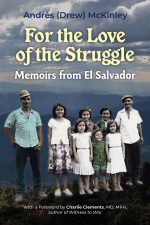
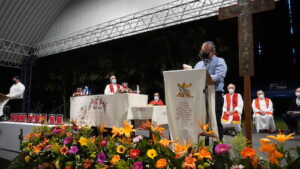



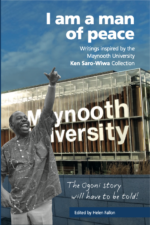

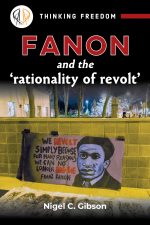



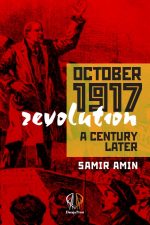

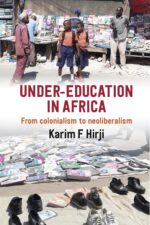


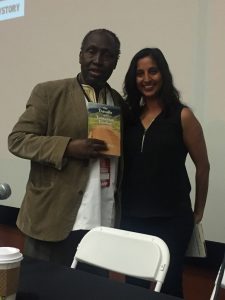 Ngũgĩ wa Thiong’o with Rosa Hirji, holding a copy of The Travails of a Tanzania Teacher i.
Ngũgĩ wa Thiong’o with Rosa Hirji, holding a copy of The Travails of a Tanzania Teacher i.

